The Order of the State Regulatory Service of Ukraine dated November 16, 2017 No.139 approved the Implementation Plan of unified state supervision (control) measures for 2018.
We remind that according to Art. 5 of the Law of Ukraine “On Basic Principles of State Supervision (Control) in the Sphere of Economic Activity”, the grounds for carrying out a comprehensive planned state supervision (control) activity regarding a business entity are including the same entity into plans of state supervision (control) measures of various supervisory (control) bodies.
Such a comprehensive planned activity is carried out once a year, and all supervisory bodies that have planned to inspect this entity can inspect it exclusively within the timeframes established by the Implementation Plan of unified state supervision (control) measures for 2018.
You can find out who and when will be inspected in 2018 in the pilot module for planning state supervision (control) measures http://ias.brdo.com.ua, which has been recently launched by the State Regulatory Service of Ukraine together with the Ministry of Economic Development and Trade of Ukraine and with the support of the Better Regulation Delivery Office (BRDO).
The Verkhovna Rada Committee on Construction considered and approved the draft law No.7151 “On Basic Requirements for Buildings and Facilities as well as Conditions to Place Construction Products on the Market Harmonized with the EU Legislation”.
BRDO experts participated in the drafting of this law.
Essentially, this draft law is the rules necessary for the further evolutionary step of the national system of technical regulation. It is based on the provisions of European rules and practices regarding placing construction products on the market – from production to use. The draft law No.7151 even introduces the legal concept of “construction product” in the regulatory framework of Ukraine for the first time.
The draft law aims to eliminate the regulatory vacuum in terminology, establish a mechanism for determining the basic requirements for buildings and essential features of technical parameters of construction products, introduce clear requirements for standard technical specifications that will be a national standard or a technical certificate.
The draft law stipulates that the main, most important requirements for buildings are the safety of people and the environment, energy efficiency and heat retention as well as the balanced use of natural resources. According to its provisions, essential features of technical parameters of construction products (resistance, durability, water permeability, etc.) will be set on the basis of already established requirements for buildings.
The draft law introduces such a modern, clear for all European producers and consumers mechanism as a Declaration of Performance. The Declaration, which will be registered by producers based on the conclusions of technical approval bodies, will stipulate that producers are responsible for the conformity of construction products with the declared technical parameters and should provide information support for the search for data on technical parameters of construction products while they are offered in the market.
The declaration can be changed only by producers and checked by all market participants. Thus, any distributor or consumer will be able to track the detailed path of a specific construction product or batch – from own apartment to the factory. This principle introduced in most European countries will allow Ukrainian producers to integrate into the European quality control system and guarantee Ukrainians protection against low-quality counterfeit products or abuses.
“The adoption of this draft law will strengthen the protection of consumer rights, introduce mechanisms for effective control over the quality of construction products and, most importantly, will remove a number of barriers for free access of Ukrainian producers to EU markets and facilitate access to markets in most countries of the world,” the Construction sector Head at the Better Regulation Delivery Office Olena Shulyak said.
For further details about the benefits, see the presentation:
[gview file=”https://brdo.com.ua/wp-content/uploads/2017/11/Preza_-7151.pdf”]
What is the software development market in Ukraine and should it be regulated?
The Ukrainian software development market ranks third in the country in terms of export while being second only to the food sector and metallurgy. The share of the software market is 26% of the export of services.
In 2016, the market increased tax revenues to the budget by 88%, which amounted to 7.1 billion hryvnas.
Probably, this is the reason why the government decided to pay attention to the regulation in this area. The Better Regulation Delivery Office (BRDO) established at the initiative of the Ministry of Economic Development and Trade has developed the so-called Green Paper on the regulation of this economy sector, which is so important for the country. Delo.UA tried to learn more about basic details and provisions of this document.
What is the software market?
Analysts divide the market into two main areas. The first one includes outsourcing companies and R&D centers, and the second one – start-ups and product-oriented companies. Such a division occurs due to the differences in building the business processes in these companies. The market is actually based on intellectual work. Therefore, one of the most important factors in the functioning of the sector is the stability of working conditions, including paying taxes. BRDO expert give accent to the possibility of importing from abroad prototypes of equipment, for which software is developed, and to the currency regulation when selling final products, including outside Ukraine, among other important factors affecting the market.
Enterprises specializing in IT outsourcing makes the largest share of the market.
This category includes the top 10 largest IT companies in Ukraine by the number of employees.
The development and research centers (R&D), which are actually divisions of large international companies in Ukraine, represent about 6% of the market. This segment differs from the first category in that they have the only customer – the parent company.

Photo: pixabay.com
Product-oriented companies and start-ups stand apart in the market. Their difference from outsourcers is that they do not sell services, but a finished product/stand-alone service. And it can be sold as many times as they see fit. “Such companies are the owners of intellectual property items,” the research states. Experts note that this category is rather conditional in our country. After all, Ukrainian start-ups often refer to those companies whose founders are from Ukraine. At the same time, many of them work under the jurisdiction of other countries.
Impact on other sectors
The IT industry has a significant impact on other sectors of the country’s economy. For example, according to the research center “The Economist Intelligence Unit”, in the USA, 2.5 million jobs in the software development market created 7.3 million jobs in other sectors. That is, one IT specialist can create 2.9 additional jobs.
In Ukraine, 100 thousand IT employees can potentially create 290 thousand jobs in other sectors.
The research indicates the real estate market as one of the bright examples of impact on other sectors. For example, the IT sector has been taking leading positions in terms of the demand for office real estate over the past four years. “In 2016, IT companies created 41% of demand, while the pharmaceutical industry ranked second with just 21%,” the BRDO gives interesting data.
Market volume
What is the volume of the Ukrainian software market? There is no single estimation. Most experts believe that developers producing software for foreign customers create 90% of the market. According to the BRDO Office, this situation occurs due to a small number of enterprises ready to buy comprehensive IT solutions in Ukraine. In addition, companies, which are leaders in the sector, practically are not involved in public procurements because of their small volumes as well as corruption and reputational risks.
As for the volumes, according to PwC, the volume of the Ukrainian software development market amounted to $3.2 billion in 2016.
At the same time, the State Statistics Service estimates that the export volume of computer services is $1.4 billion, and the National Bank – $2 billion. Experts call this significant difference in the estimation the State Statistics Service and the National Bank a negative trend, which indicates the need for using the more improved classification. Specialists believe that the PwC company’s estimation is the most accurate, as calculated on the basis of data provided by the companies themselves.
However, both the NBU, the State Statistics Service and PwC have a common opinion: the Ukrainian software development market has increased almost more than twofold since 2011. It continues to grow even after the crisis of 2013-14, while most of the sectors of economy experienced a decline. Since 2013, the growth of the software market has amounted to 58%. According to experts, there are 1,650 companies in the market and their number has increased by an average of 41% since 2012.
Capitalization of companies in the sector
Most companies of the sector are not public and accordingly do not disclose their financial performance. This, of course, complicates the assessment of capitalization. The shares of two largest international companies – EPAM and Luxoft – are in demand in the market, and experts estimated that the capitalization of their Ukrainian divisions is about $875 and $642 million respectively. For comparison, the capitalization of Raiffeisen Bank Aval is estimated at $617 million, Ukrnafta – $267 million and Motor Sich – at $199 million.
In general, the capitalization of the 10 largest IT companies exceeds $4 billion.
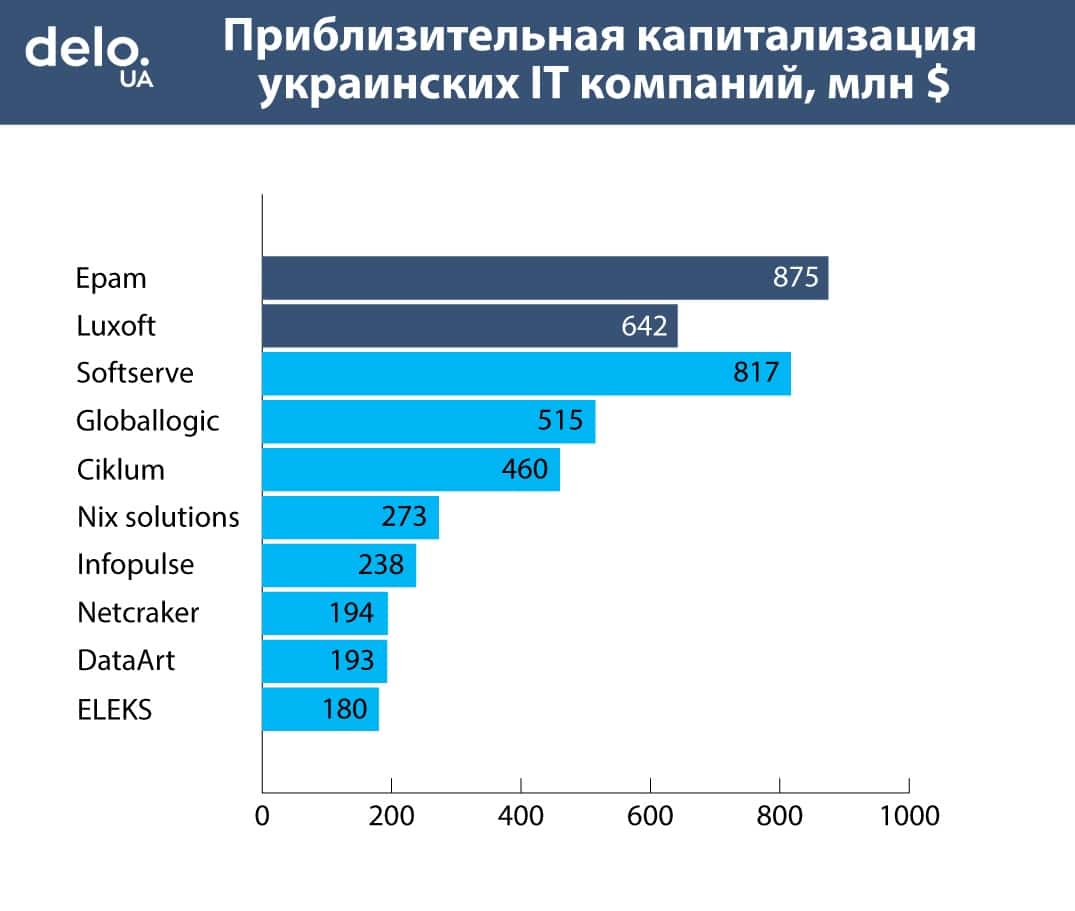
Workforce capacity of the sector
Estimation of the market volume by the number of employees varies from 87.5 thousand to 103.5 thousand people. The average annual increase in number of specialists employed in the sector is 15-20%. One-third of all employees work in TOP-25 largest companies in the sector.
The interesting point is related to the geographical concentration of programmers. For example, according to researchers, less than half of the employees in the sector are concentrated in the capital, but only 13 of the TOP-50 companies are represented in Kiev.
At the same time, wages in the regions remain almost at the level of the capital. While the average wage of programmers in Kiev is $1,899, it is $1,673 in Lviv and $1454 in Kharkov. “Such geographical spread helps raising the standard of living and development of regions,” the research states.
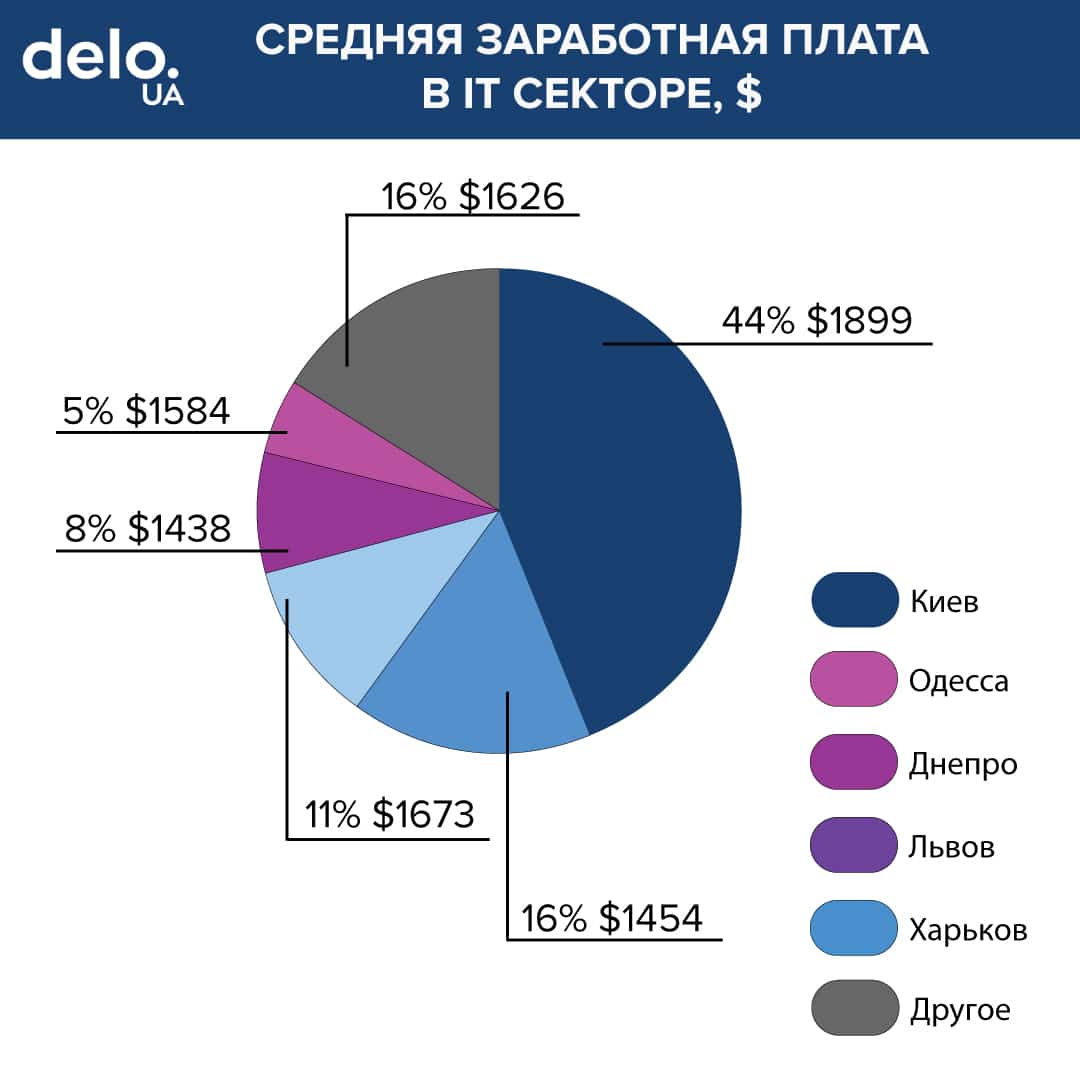
Distribution of wages by region according to the BRDO’s research
According to the research, the average wage for novice programmers is $591. “This is almost 5 times higher than the minimum wage established by the state,” analysts note. However, the starting salary in the sector ($610) has even decreased since 2015. More experienced developers earn on average $1,700 in Ukraine.
The important factor in the market is also the high demand for specialists. As of mid-2017, more than 3 thousand vacancies were opened in the sector.
At the same time, this number has doubled since 2015.
Experts report about problems with incumbency rates and explain it with a number of factors. One of them is the outflow of graduates of IT specialties, which, according to different estimates, ranges from 25 to 35%. Another problem is the incompatibility of education with the market requirements and its long period. For example, today it takes 45 to 70 months to train one IT specialist. Experts believe that in case of updating training programs, this time can be reduced to 31-59 months.
Source: delo.ua.
From the beginning of 2018, the moratorium on business inspections will be terminated in Ukraine. There will be more inspections, but the parliament and the government still tried to soften this blow to entrepreneurs. Delo.UA figured out what changes to the rules of inspections entrepreneurs should be prepared for.
In a month and a half – from the beginning of 2018 – the moratorium on business inspections, which was first introduced by Arseniy Yatsenyuk in August 2014, and then extended by Vladymyr Groysman in the end of 2016, will be terminated in Ukraine. The deregulation adherents declared at that moment that the current excessive pressure on the business by the state supervisory bodies was disproportionate to the actual results of inspections. They said, state supervision didn’t lead to reducing the number of fires or increasing the safety of products.
“For example, statistics of food safety and hazard does not change. We are talking about 70% of counterfeit products every year. Regardless of whether there are inspections or not. Statistics are always bad,” the head of the State Regulatory Service (SRS) Kseniya Lyapina explained the need for the moratorium year ago. According to the SRS head, inspectors with inspections visit just legal entrepreneurs, and unscrupulous business owners, they say, simply get off with this.
Lyapina assured that they would be able to build a more efficient and transparent system of state control for the year of the moratorium period.
Public inspection plans
At the end of last year, the Verkhovna Rada adopted another law along with the moratorium on inspections – the law on liberalization of state supervision. The authors of the document insisted that it would add clarity and transparency to the procedures to control entrepreneurs.
The existence of general and special laws as well as many subordinate acts are often the problem of Ukrainian legislation. The “rule of the game” for business are set by dozens of documents – several laws, resolutions of the Cabinet of Ministers, decrees of certain ministries, orders and instructions of particular executive bodies. The deputies tried to simplify the system of inspections for entrepreneurs a little bit with the help of the law on the liberalization of state supervision.
Firstly, the law extended the general rules of state supervision and restrictions on the duration of control measures to the inspections of the State Fiscal Service (SFS), the State Architectural and Construction Inspectorate (SACI), the State Service for Labor and some other bodies. Secondly, the document obliged the State Regulatory Service to develop an integrated automated system of inspections, where starting from 2018, inspectors should enter not only plans of inspections, but also summary reports and reports on violations found, in 2017.
A few weeks ago, the State Regulatory Service together with the Ministry of Economic Development and the non-governmental Better Regulation Delivery Office (BRDO) launched a portal where all state supervision measures will be published.
Any enterprise can already check online whether it is included in the plan of comprehensive inspections for 2018 via just by entering its EDRPOU code.
The BRDO Head Oleksiy Honcharuk says that at this point, it is just a pilot mode of a unified system of inspections. According to him, a large database, a large integrated system should be created in parallel. “But the pilot mode does not mean that the functionality of the system launched is limited. Everything that the law provided for will be implemented,” Honcharuk assures. “All government bodies are already connected to the module, they have personal profiles and upload all their inspection plans for the next year to the single database. All inspection plans – both comprehensive and annual plans of the bodies should be in this module in 2018.”
Nevertheless, for now, there may be no inspection plans of those bodies, for which law has established exceptions and does not directly oblige to submit their plans of inspections to enter into the system, for example, the SFS.
The BRDO Head also says that the government is planning by its order to oblige government agencies to publish, in addition to the plans, other information, in particular data on unscheduled inspections conducted, forms of inspection acts with a clear list of questions to ask entrepreneurs during supervisory measures as well as information on the risk criteria, based on which government agencies makes their inspection plans.
“We are now working on the implementation of the law (on liberalization of state supervision – Ed.) adopted last year. We are trying to change the system of state supervision. After all, now the number of inspections does not correlate, for example, with the number of fires. Nevertheless, about 80 of our state bodies are subjects of this reform process. Saying correctly, they have a different attitude to these innovations. Basically, it is negative,” the First Deputy Minister of Economic Development Maksym Nefyodov says.
The plans for 2018 are as follows: to develop risk criteria for a “healthy person” (as the MEDT says, the current ones are outdated and primitive), this will allow to divide enterprises into groups and inspect the risk companies. Secondly, it is necessary to develop a methodology regarding what exactly the state agencies should control. After all, now the business does not understand what requirements it should fulfill, while control bodies inspect the company’s compliance with all the laws.
There will be more inspections after the moratorium
The deputies did not register initiatives to extend the moratorium. This measure, they said, was temporary. Therefore, it is likely to be terminated from the beginning of 2018.
To tell the truth, the current moratorium is not an absolute ban on business inspections, it rather acts as a restriction.
Planned inspections are now forbidden for most agencies, including the State Service for Labor, the State Environmental Inspection, the State Service for Emergency Situations, the State Architectural and Construction Inspection. But there is an exception provided for a small number of supervisory bodies. For example, the State Fiscal Service, the State Service for Food Safety,
the State Service for Export Control, and the State Aviation Service can conduct inspections in the current year.
In addition, unscheduled inspections are still carried out all year round. The only thing, the procedure to conduct them was made more severe since the beginning of 2017: a list of grounds for such a control measure was reduced, and the government bodies were obliged to obtain permission from the State Regulatory Service. According to the information of the SRS, it gave permission to conduct 150-250 unscheduled inspections of enterprises per month throughout Ukraine.
After the termination of the moratorium in 2018, planned inspections will be a full part of the life of entrepreneurs. But the parliament and the government tried to soften this blow for business a little bit.
The law on liberalization of state supervision introduced a new rule: if a company is included into inspection plans of several government bodies at once, they are obliged to carry out control measures comprehensively and at the same time.
The Ministry of Economy is optimistic: they expect that this step will reduce the number of contacts between the supervisory bodies and the business by 15-30%.
Cement is the main material of modern construction in Ukraine, which is the most widely used binding material as well as the main component of concrete. At current production rates, Ukraine is provided with cement raw materials for 320 years, but produces less products than consumes with a tendency to increase imports. Ukraine has the second lowest cement production rate per capita in Europe – 213 kg by the results of 2016. For comparison: it is 489 kg in Poland, in Germany – 342 kg.
Despite the relatively stable production volumes, the cement market has a number of problems that can seriously affect the development of the construction industry in Ukraine. Today, there are 24 enterprises operating in the market and ¾ of them are loss-making. The cost of regulation for one enterprise, which produces cement, is 400 thousand hryvnas per year.
The government, business and public representatives discussed the ways for solving the market regulation issues during the round table “European quality of Ukrainian cement: risk factors” organized by the Better Regulation Delivery Office (BRDO) with the support of EU4Business\FORBIZ and the Ministry of Regional Development as part of the Public Dialogue #PRODialogue on November 14.
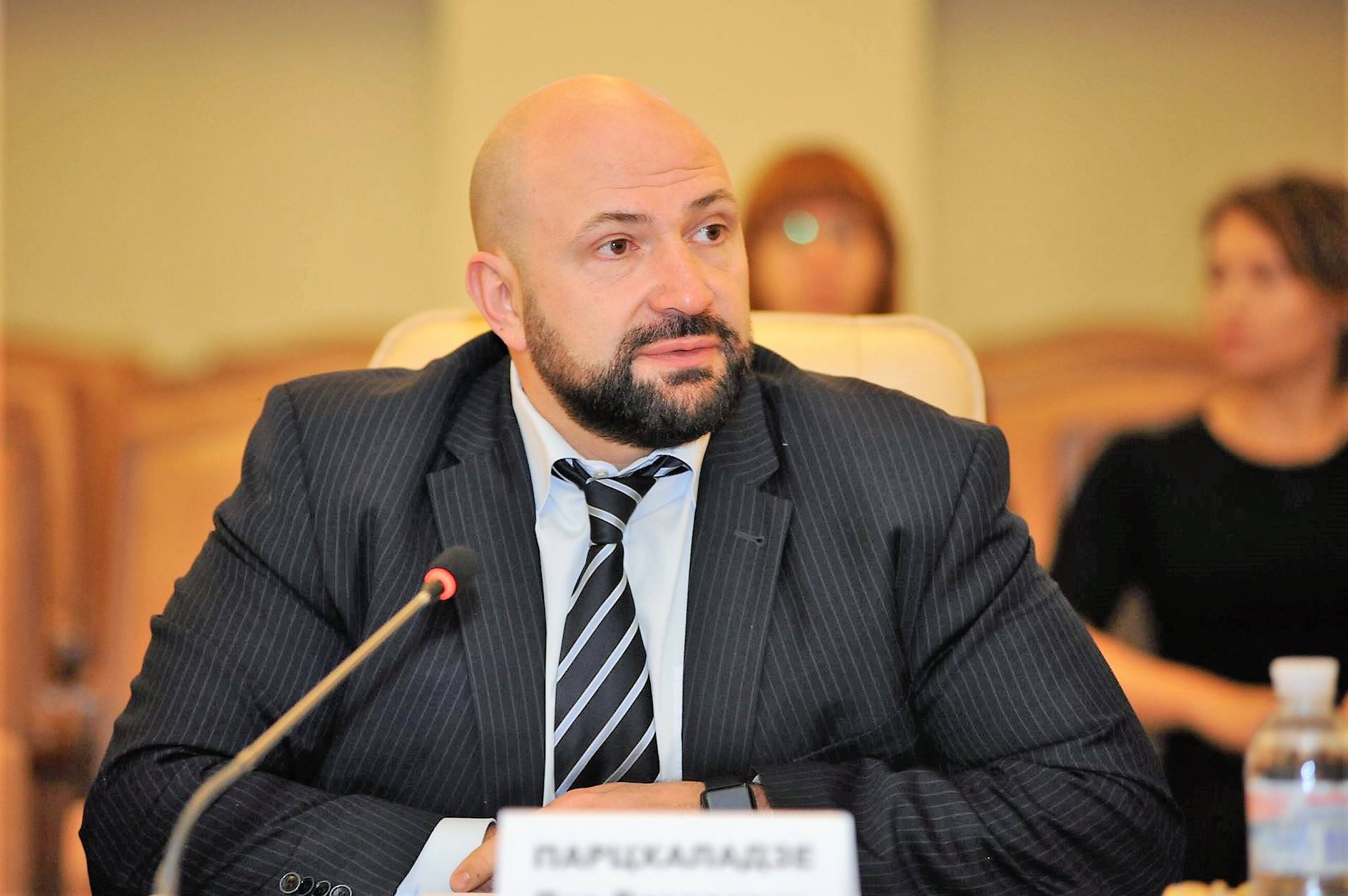
“We have planned to review the regulation of 48 construction markets together with the BRDO Office this year. The market of cement has great prospects: about 9 million tons of cement are produced annually in Ukraine, but these volumes do not cover all existing demand. Due to ineffective regulation of the sector, the quality of construction materials deteriorates and consumers are not protected. It is important to adopt modern efficient production technologies and create conditions for medium and small enterprises to access the market, especially in the regions. We will not simply state the problems, instead, we will formulate particular proposals for more effective regulation of the cement market,” the Deputy Minister of Regional Development, Construction, Housing and Utilities of Ukraine Lev Partskhaladze said when opening the event.
The Better Regulation Delivery Office (BRDO) found out that 11 from 41 acts regulating the market should be updated. Moreover, the analysis of regulatory instruments and related procedures revealed a high level of corruption risks. The existing regulation hinders the development of the market and does not guarantee the protection of consumers from counterfeit products. The coefficient of counterfeit cement among products with marking violations in the market is about 80%. 60% of products do not meet the strength criterion. In some cases, the indicator, on which the strength of construction materials depends, is 5 times lower than the national standard.
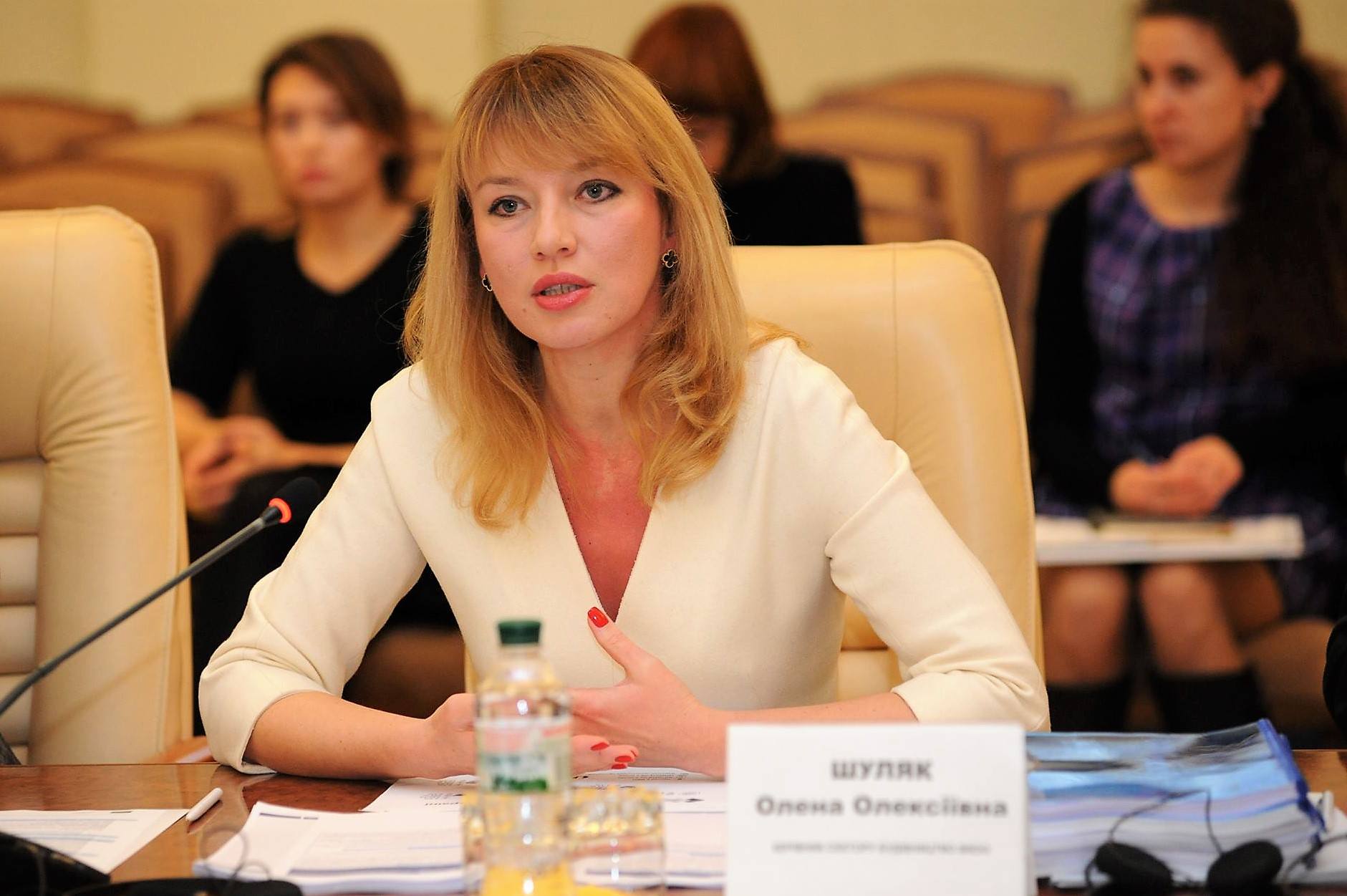
“The ineffectiveness of market surveillance mechanisms in Ukraine, as well as the lack of adequate accountability of certification bodies and the relevant information on revoked certificates allows unscrupulous producers to provide the market with poor-quality counterfeit cement. From January 1, 2018, when the system of mandatory certification of products UkrSEPRO* is abolished, the state will not have any instruments to control the quality of construction materials at all,” the Construction Sector Head at BRDO Olena Shulyak said.
In addition, according to the expert assessment of BRDO, the current legislative framework for technical regulation of the market is an obstacle to the introduction of new technologies and the entry of producers into international markets. Export opportunities are limited by the need to certify products according to international standards. Currently, there are two certification systems in the cement market: outdated Soviet and European ones. This dual regulation creates numerous gaps in technical regulation and complicates the market operation.
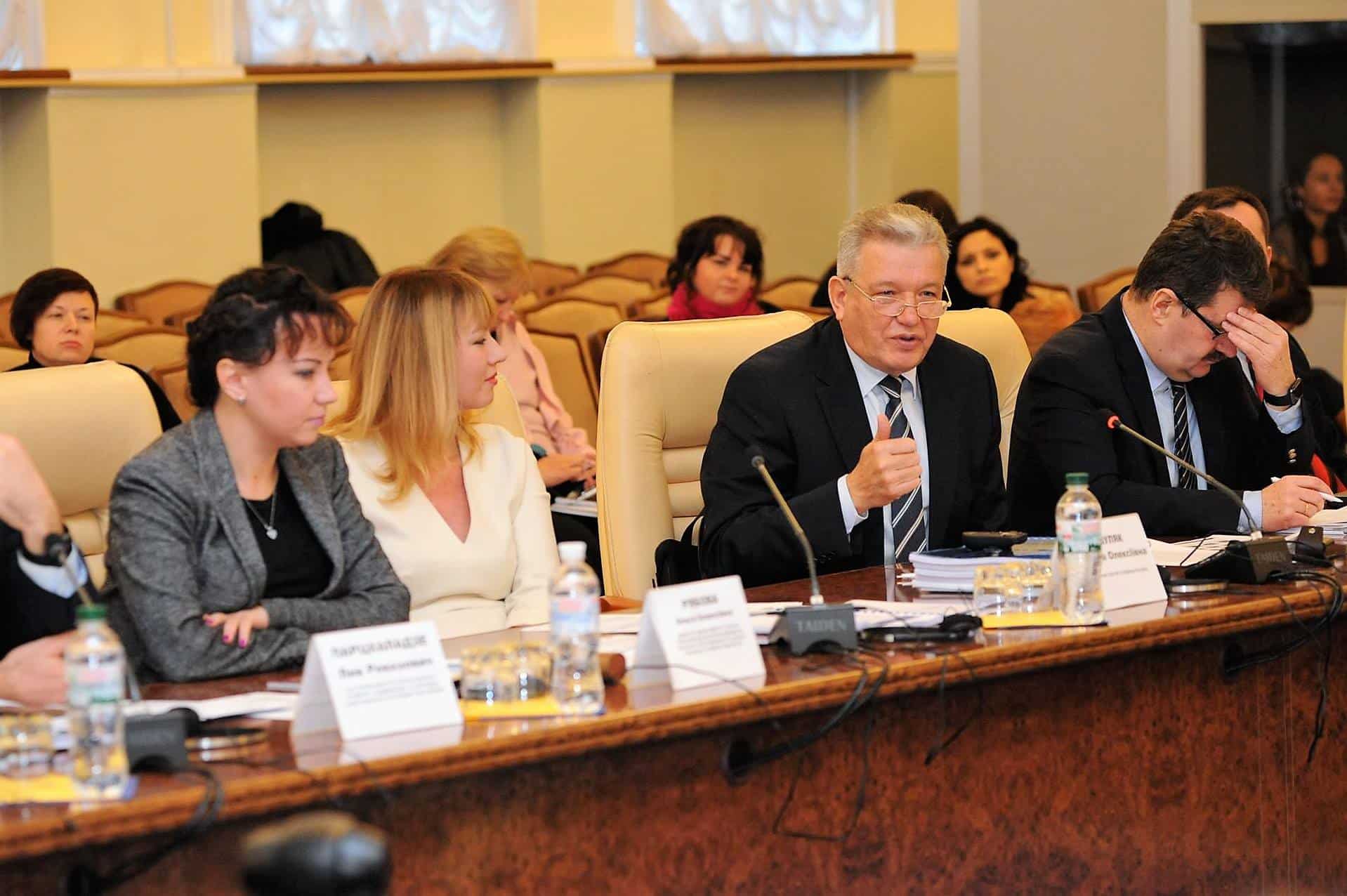
Having taken on obligations under the Association Agreement with the EU, Ukraine should harmonize the national standards for construction products with European ones, in accordance with the EU Regulation 305/2011. This will help reduce non-tariff barriers for the development of export-import operations.
“The EU Delegation through the EU4Business\FORBIZ project works closely with the BRDO Office to create better conditions for the development of small and medium-sized businesses in Ukraine as well as to implement the provisions of the Association with the EU. The market of cement is one of the key sectors for the country’s economy, given its capabilities for infrastructure development. Therefore, it is very important to find the best regulatory practices that can fully develop it and take to the next level,” the Head of Section “Economic Cooperation, Social and Regional Development” of the EU Delegation Juana Mera Cabello says.
Ukraine is planning to fully implement provisions of the EU Regulation 305/2011, which establishes harmonized conditions for placing on the market of construction products, by 2020. That is, the first development and adoption in 2017-2020 requires 377 harmonized standards.
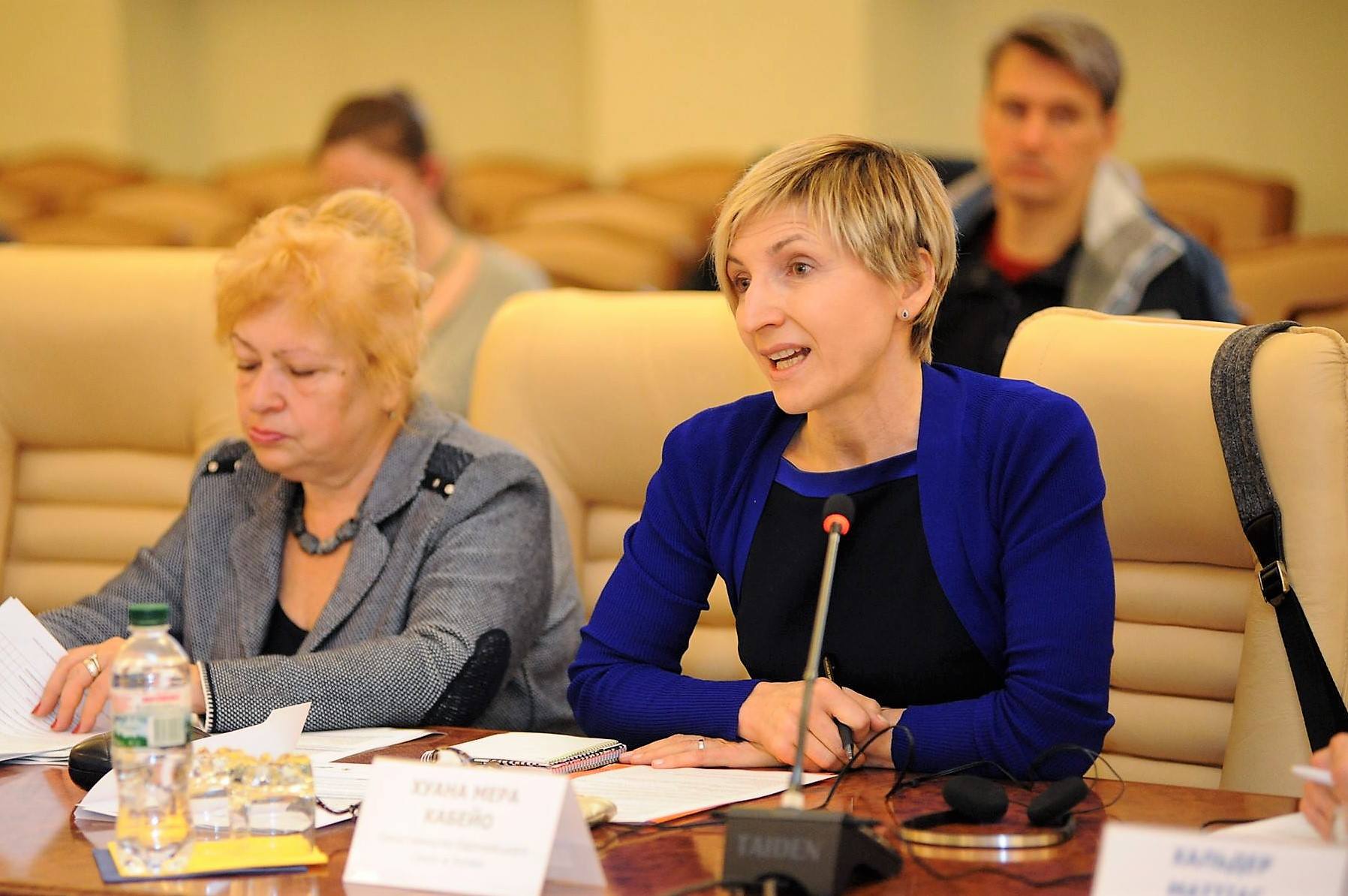
Pavlo Kachur, the Head of the Association of Cement Manufacturers “Ukrcement”, Oleh Tsilvik, the Deputy Chairman of the All-Ukrainian NGO “Union of Consumers of Ukraine”, representatives of the Ministry of Economic Development and Trade, the State Regulatory Service, business, the expert environment and the public also took part in the round table.
The results of this discussion will be used as the basis to develop proposals for legislative changes in the cement market.
*The Law of Ukraine “On Technical Regulations and Conformity Assessment” will cancel the system of mandatory certification of products UkrSEPRO on January 1, 2018. There is a need to resolve the issue before the introduction of the Law of Ukraine “On Basic Requirements for Buildings as well as Conditions for Placing on the Market of Construction Products”.
Source: 24tv.ua.
In a few days, the parliament will consider a draft law that will help improve the investment climate in Ukraine. Experts call it the reformatory and key one to attract $10 billion of investments, create new jobs and improve the well-being of Ukrainians.
As the experts of the Better Regulation Delivery Office (BRDO) explained to the website “24”, the purpose of the draft Law on amendments to some legislative acts of Ukraine regarding improving the investment climate in Ukraine No.6540 is to increase the Ukraine’s investment attractiveness in the global economy and improve the business climate in the country, while the draft law’s KPI is to improve the Ukraine’s positions in the DoingBusiness rating, which is a internationally recognized indicator of ease of doing business in the country.
Experts explained: the government takes into account the Doing Business rating (index of ease of doing business developed by the World Bank), because many investors are guided by it when choosing which country it is better to invest in, where it is better to launch and maintain their production.
“A country’s rise of 1 position means an increase in the inflow of investments into its economy by $600 million. Ukraine ranks the 76th in the Doing Business 2018 rating. We have risen by 7 positions over the past two years. We estimated that the draft law 6540 would help Ukraine to rise by 32 positions in the rating,” the BRDO Head Oleksiy Honcharuk said.
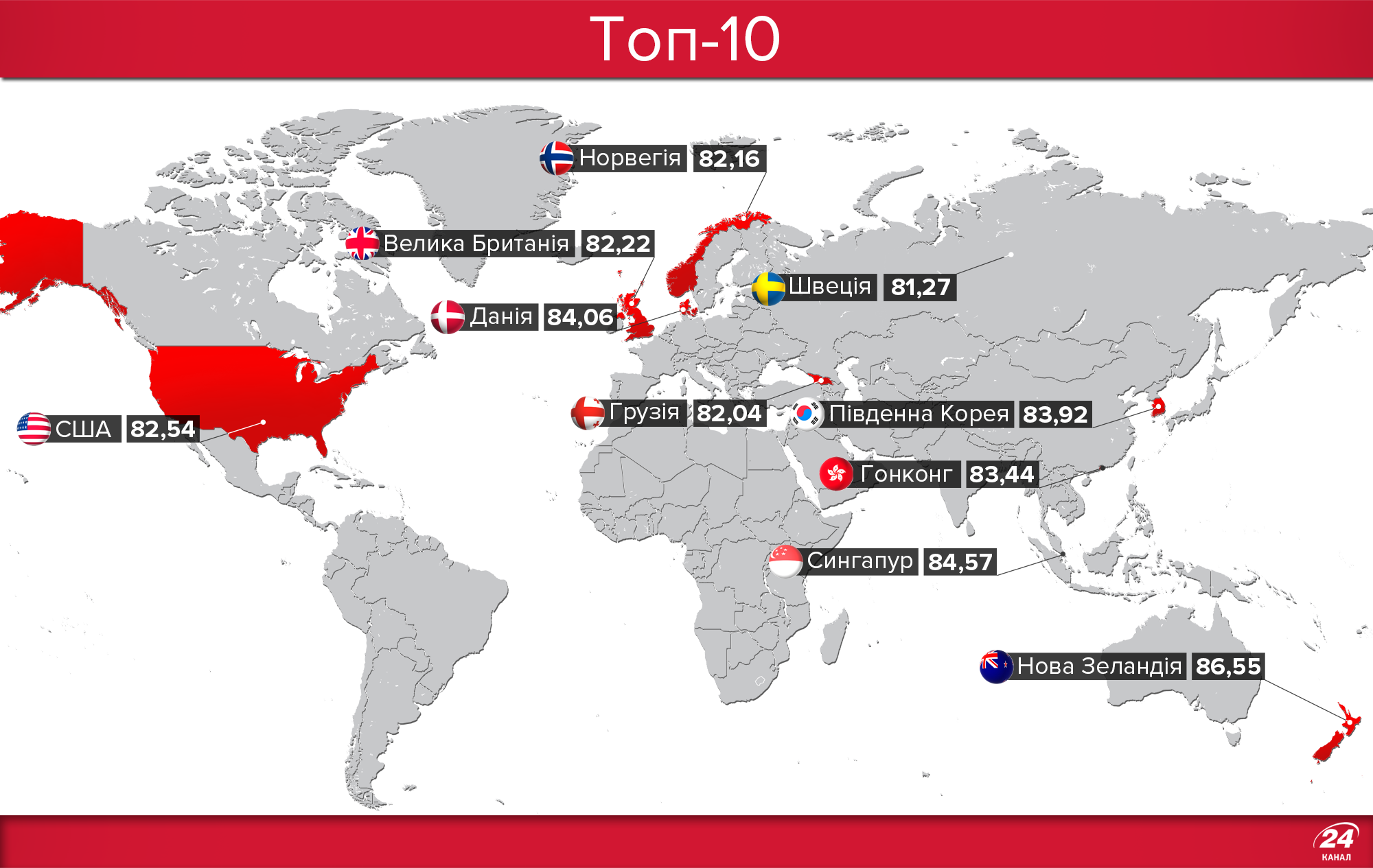
Top-10 in the Doing Business rating
Experts add that other countries also takes into account this rating and do a lot, because they are also interested in attracting investors. To keep the same position in the rating, you need to run, but to move forward – you need to run twice as fast. That is why it is necessary to approve the draft law 6540 already this year. Otherwise, we risk to worsen our position in the rating for the
next year. This should not be allowed to happen, since we are still behind the countries of Eastern Europe.
For comparison, Estonia ranks the 12th, Poland – the 27th, Belarus – the 28th, Russia – the 35th and Georgia – the 9th in Doing Business 2018.
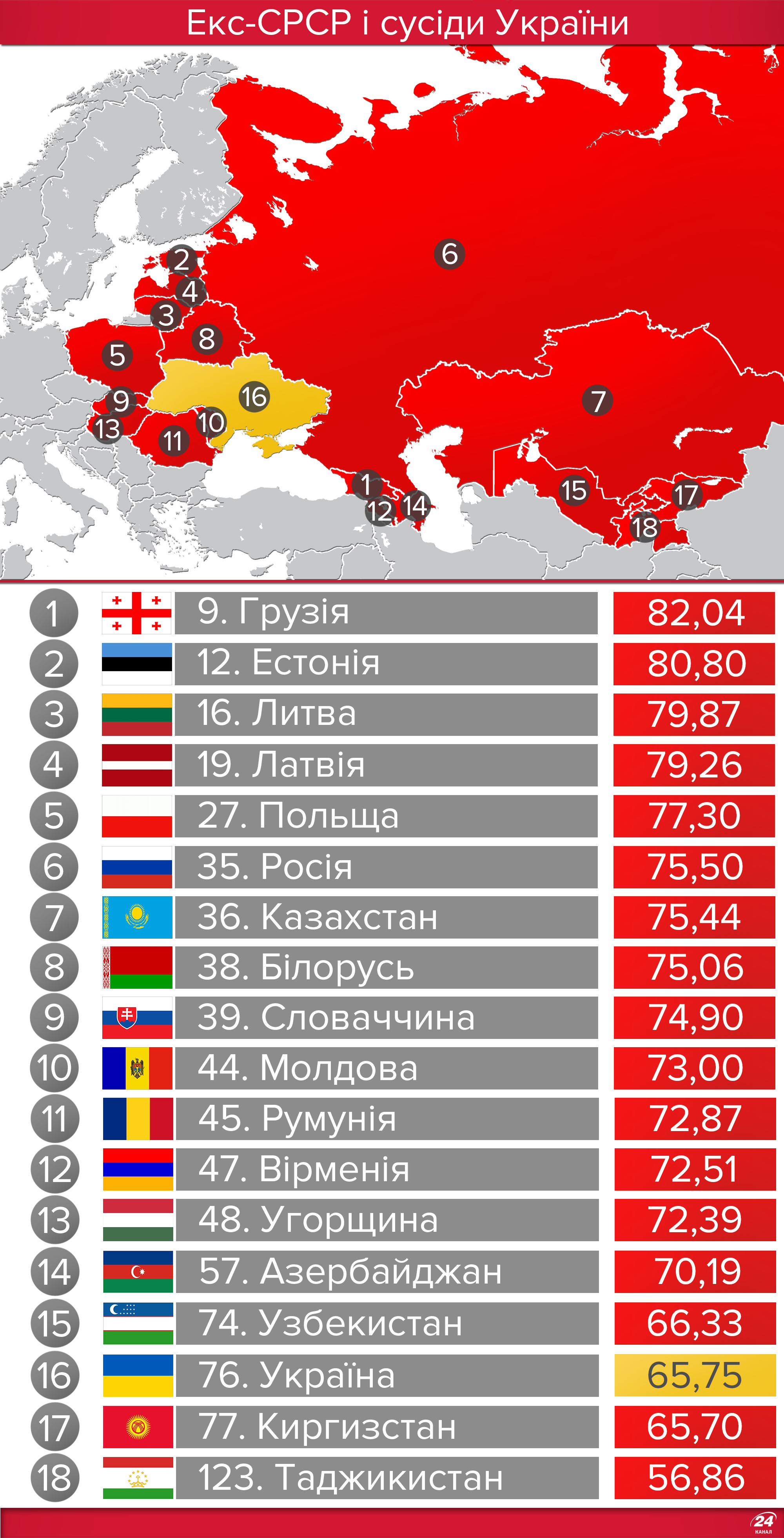
Only Kyrgyzstan and Tadzhikistan have lower positions than Ukraine among post-Soviet countries
The rise in the rating and investments give an additional impetus to the economic development, as they facilitate the modernization of production, introduction of innovations, creation of new jobs and increase tax revenues to the budget, that is, in general, improve the well-being of Ukrainians.
“The draft law 6540 improves the business environment significantly. It simplifies construction conditions, makes credits more affordable, enhances the protection of shareholders’ rights and makes it easier for entrepreneurs to go through many legal procedures. For example, it cancels share participation, introduces the trust ownership and simplified bankruptcy procedures,” Oleksiy Honcharuk clarified.
These comprehensive changes will not only encourage investors, but also motivate Ukrainian business to develop, as they provide it with many new opportunities.
In Mexico, the introduction of reforms to progress in the Doing Business rating has led to the fact that 15% of entrepreneurs started to work legally. This is a possible scenario for Ukraine as well. In such a way, 6540 will help reducing the share of shadow economy at the same time.
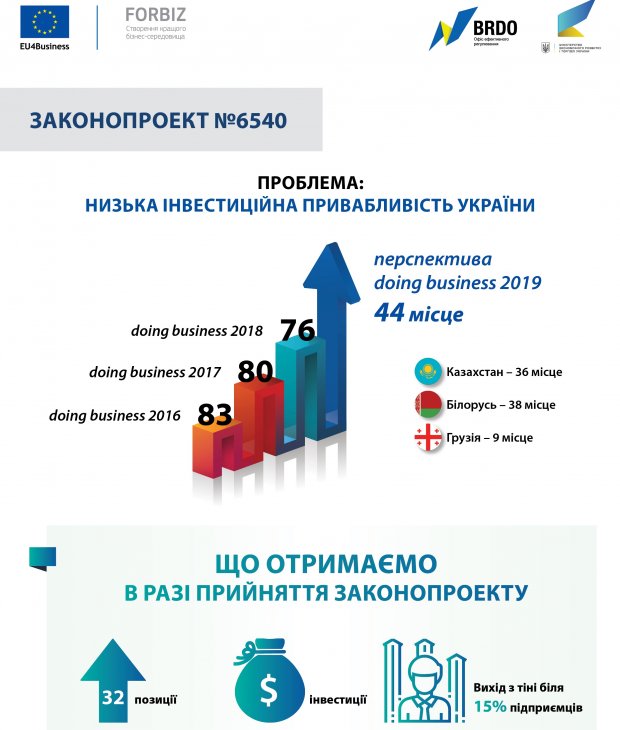
Protection of shareholders’ rights:
– a the joint-stock company, which concludes the agreement, should immediately disclose information about the conflict of interests by all means, if there are any;
– strengthening the personal responsibility of joint-stock company’s officials and majority shareholders for losses caused by obviously loss-making transactions;
– shareholders have the right to learn all documents related to the joint-stock company activities;
– a joint-stock company can choose an independent auditor exclusively at the general meeting of shareholders;
– a shareholder who buys 50% of the company’s shares necessarily receives an offer to buy out shares of minority shareholders they would like to sell.
System of justice:
– simplified access to evidences;
– introducing mandatory “weighing” of evidence by court (higher credibility standard in economic procedures).
Easing of credits (implementation of Article 6 of Directive 2002/47/EC):
– introducing an alternative to pledges and mortgages – trust ownership as an effective way to ensure fulfillment of obligations.
– if the risk of credit defaults is reduced, banks can reduce credit interest rates;
– increasing the availability of information on honesty of borrowers through the bureau of credit histories. In such bureaus, companies provide each other with information about borrowers. At present, only financial institutions can be their participants in Ukraine, but the draft law allows other companies also to join the bureau.
Access to alternative dispute resolution:
– expanding the competencies of arbitration courts;
– introducing additional requirements and liability for arbitration courts and judges.
Contract enforcement:
(implementation of certain elements of the Directive No. 2013/11/EC, the EU Council Directive 93/13/EEC, Commission Recommendations No. 98/257/EC and No. 2001/310/EC)
– if terms of a contract are not fulfilled, the parties will be able to file a suit and exchange other documents with the court online
– broadening options to use arbitration courts to consider disputes.
Construction:
– real estate developers will no longer have to pay a share contribution to the development of the settlement’s infrastructure;
– a quick and transparent procedure for assigning construction and postal addresses.
Bankruptcy:
– introducing individual bankruptcy procedures of debtors with a majoritarian lender or whose property is transferred to a mortgage.
Land:
– notaries will not be able to demand an expert monetary valuation of land plots without a reasonable basis.
The approval of this draft law will allow Ukraine to attract 10 billion of potential investments into the country, bring about15% of entrepreneurs out of the shadow economy as well as create new jobs and improve the well-being of Ukrainian citizens.
And as the BRDO stressed, the Verkhovna Rada had currently a key to this.
Written by Yanina Tkachuk.
Source: radioosvoboda.org.
Ukraine moved to the 35th position among 190 countries in terms of the component “Obtaining construction permits” in the Doing Business index – that is, its ranking grew by 105 points. According to the BRDO Construction Sector Head Olena Shulyak, improved Ukraine’s positions in the component of obtaining construction permits is a good news. However, she stressed out that the analysis of the procedure was carried out only in Kiev, and this fact affected the results.
“In Kyiv, the procedure for calculating the share participation in infrastructure development was changed. Last year, this figure amounted to 10% for commercial real estate, and in 2016, a new procedure was approved, and the developers paid 2%, taking into account a decreasing coefficient of 0.5 adopted for 2017,” Olena Shulyak said in the “Rankova Svoboda” radio program. She argues that the reduction of expenses on share participation payments has made life easier for real estate developers in the capital. However, the expert adds that if the Doing Business rating took into account the situation in Lviv, Odesa or other Ukrainian cities, the indicator would remain low.
Olena Shulyak agrees that changes in the legislation affected the Ukraine’s position and specifies that not all of them were taken into account this year and will still affect the next rating. But, in addition to the cost of share participation, she also pays attention to the cost of technical inspection.
“Last year, this figure was 5% of the cost of all construction works, and this year, when we were included in the Doing Business rating, this figure was 1%,” she explains.
Olena Shulyak also believes that the Ukrainian real estate market faces with enough challenges. One of them is a low housing affordability index for buyers. “According to the rating conducted by the Bloomberg international agency, Kyiv is the second worst among the world’s cities in terms of the criterion of housing affordability. This suggests not only that we have very expensive housing, but also that the population has very low incomes,” she says. In the expert’s opinion, the reason for this situation is virtually no access to credit resources for potential real estate buyers.
BRDO experts concluded that changes in self-regulation should start from developing the state policy instead of the laws. A draft Concept prepared based on the results of discussions during the round table as well as consultations with stakeholders (online and workshops) reflects this conclusion.
The Concept describes the problems and disadvantages of the current self-regulation institution in Ukraine and proposed ways to solve today’s problems. In addition, it contains clearly stated expected results and methods for assessing the effectiveness of introducing changes proposed by the document. Based on the content of such a document as the Concept, it directly provides for basic and key positions on the introduction and implementation of self-regulation.
The Concept will for sure become the subject of discussions and, as a result, it should be based on the balance of interests of all stakeholders. After all, the main idea of the proposed state policy in this area is that self-regulation should be developed from the bottom up, but not be imposed by the government. The government’s participation in self-regulation processes – at the minimum required level. A model of co-regulation development, which is separate from self-regulation in the concept while being the next, more complicated stage, is somewhat different.
Welcome to the discussion.
“Software development industry may grow by 25-30% per year. This means doubling every three years”- CEO of the largest IT company in Ukraine. At such a growth rate IT industry may surpass by 2021 the export of the entire iron and steel industry.
In October leaders of Ukrainian IT outsourcing companies, representatives of government and parliament, as well as the EU Delegation discussed the future of software development market in Ukraine. The event took place at UNIT.city. The occasion – presented by the Better Regulation Development Office (BRDO) a comprehensive analysis of the market and its regulation (the Green Paper). During the meeting, number of interesting facts were voiced by business, experts and authorities. Details – in this article. (The full video of the meeting – at the end of the page).
The market is significant for the country
Ukrainian IT outsourcing has become the third country’s export industry. Despite the fact that in 2013 it was not even in the top five. It is explained by the fact that only 1 of 7 major export industries grew over the past three years – IT outsourcing.

The same fact was stressed by representatives of the EU, Jocelyn Guitton, Acting Head of Trade and Economic Section of the EU Delegation to Ukraine: “It is not just about perspective, it already creates real opportunities, makes a significant contribution to the country’s GDP.”
The growth potential is huge
In recent years, industry grew – about 15% per year. CEO of EPAM (about 5000 developers in the Ukraine), Yuriy Antoniuk believes that the growth rate of 25-30% per year is achievable. He says that not only as a CEO of the largest IT outsourcing company in Ukraine, but also as President of “IT Ukraine” Association (it unites the largest IT companies of the country).
If we manage to achieve such a growth rate of the industry:
Representatives of all leading IT companies said that they have plans to grow in Ukraine.
It is important that for the state not to intervene in this process.
The lack of regulation and government intervention in IT industry was a significant stimulus for growth. This was mentioned by Alexander Danchenko – the head of the Parliament Committee on Informatization and Communication and a representative of the EU Delegation – Jocelyn Guitton.
BRDO experts proposed to implement a guarantee of tax conditions stability for IT outsourcing. This will give confidence to companies and their customers, thus, it will lead to a faster growth of the software development market.
IT services export market faces global competition.
Taxation of salaries for developers is very important for development of the industry. This was stated by Aleksey Skrypnik, Member of Parliament and co-founder of Ukrainian IT outsourcing company ELEKS.
Importance of taxation is caused by 2 reasons: international competition for programmers and it’s influence on the final cost of IT services.
At the moment, the use of the simplified taxation system allows IT industry to be competitive:

Maxim Nefyodov, The First Deputy Minister of Economic Development and Trade of Ukraine, also drew attention to this aspect. According to him, Ministry of Economic Development and Trade is definitely a supporter of competitive taxation for IT companies and is ready to insist on this position.
Almost everyone said that education is also crucial for the development of the industry. According to business representatives, all IT companies fund development of Ukrainian education, including help to state universities.
Yuriy Antoniuk announced that: EPAM spend on education about $ 10 million per year and 70% of the sum is not related to EPAM employees.
Marina Vyshegorodskikh, a senior adviser to the Board of Directors of Ciklum Holdings said that IT education was included in the top 3 priorities of “IT Ukraine” Association. In the near future they will roll out a new activities in the direction.
Vladimir Beck, co-founder of Sigma Software, Chairman of IT Committee of European Business Association, also said that his company is funding education, not related directly to the company’s employees.
Software developers are leaving Ukraine and in general this is not a problem. Firstly, many of them return, and secondly, in the modern world experts migrate between countries.
The problem is that this process is one-sided in Ukraine – Ukrainians are leaving, and foreigners do not come.
BRDO experts stressed that they know how to solve this problem:
BRDO has already developed CMU draft resolutions resolving these issues.
IT services should be in demand not only abroad but also at domestic market. Nikolay Roenko, the founder and President of Miratech, said that today the industry is mostly driven by the international market. The domestic market is very small and has the effect of pent-up demand. According to him, there are countries that show that the domestic market can be a driver of growth. The situation should begin to change.
While, many participants voiced negative examples of state IT projects (eg, declaration the system), as well as their negative impact on image of the industry.
Five-described items were discussed before. The difference of the dialogue is well described Marinoy Vyshegorodskih: “Thanks to the Green Paper for the first time this dialogue becomes data and facts driven. When are the facts and figures are on the table the dialogue has a different quality.”
As the end of the dialogue we fully agree with Igor Beda, Managing Director of GlobalLogic in Ukraine, “Green Paper allows to move from dialogue to actions. It is necessary to implement them.”
[gview file=”https://brdo.com.ua/wp-content/uploads/2017/11/IT-Development-Prezi.pptx”]
Ukraine moved from the 140th to the 35th position in the component “Obtaining construction permits” in the Doing Business rating. The reason of this rise was the reduction of share participation in the Kyiv infrastructure from 10% to 2% along with the reduction of the cost of technical supervision services in construction. World Bank’s experts estimated that one position in the overall Doing Business rating would give us an opportunity to attract up to $600 million of investments into the country.
“The Ministry of Regional Development set an ambitious goal – to enter the TOP-50 in terms of the indicator “Obtaining construction permits”. According to the Doing Business 2018 rating, we managed to enter the TOP-40. In the component “Obtaining construction permits”, we rose by 105 positions from 140 countries over a year, so we moved to the 35th place and improved the Ukraine’s position in general,” the Deputy Minister of Regional Development, Construction, Housing and Utilities Lev Partskhaladze said.
The Deputy Minister added that the share contribution on infrastructure development was reduced from 10% to 2% and the market cost of technical maintenance services in construction was reduced from 5% to 1.8% in Kyiv that year.
“To improve this year’s result, it is necessary to completely cancel share participation in the development of settlement’s infrastructure, which is called a “legalized bribe” of developers. The Ministry of Regional Development carried out an analysis: no hryvna from share participation payments was spent on the construction of kindergartens, schools, hospitals or on the connection of new buildings to the infrastructure. The Cabinet of Ministers together with the BRDO Office developed a draft law No.6540, which includes the cancellation of share participation. This draft law was registered in the Verkhovna Rada, and we are very hopeful for the support of deputies,” Lev Partskhaladze summed up.
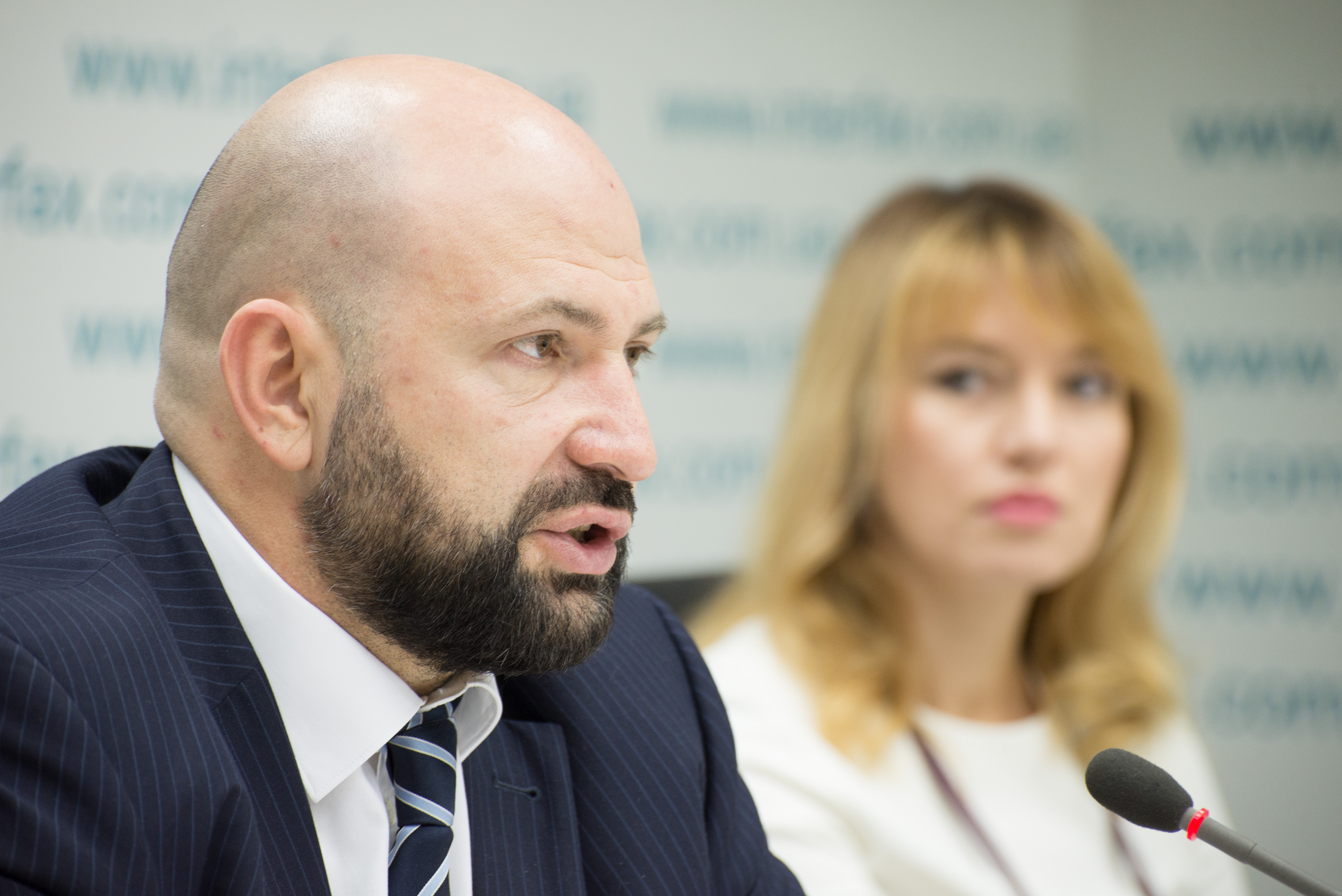
The ultimate goal of the Ministry of Regional Development for the next year is to enter the TOP-20 countries in terms of the indicator “Obtaining construction permits”.
“No other country in the world has such a rapid progress in the component “Obtaining construction permits” as Ukraine has. We established excellent cooperation with both the Ministry of Regional Development and the BRDO. We hope that the Kyiv City Council will at least extend the validity of the reduced 2% rate of share participation in the following year as well. But the best way for Ukraine is to approve the draft law No.6540 that provides for the full cancellation of share participation in construction, and the World Bank Group supports this option,” the Program Manager of the Global Practice on Trade and Competitiveness in Ukraine, Belarus and Moldova IFC/World Bank Group Heinz-Wilhelm Strubenhoff said.
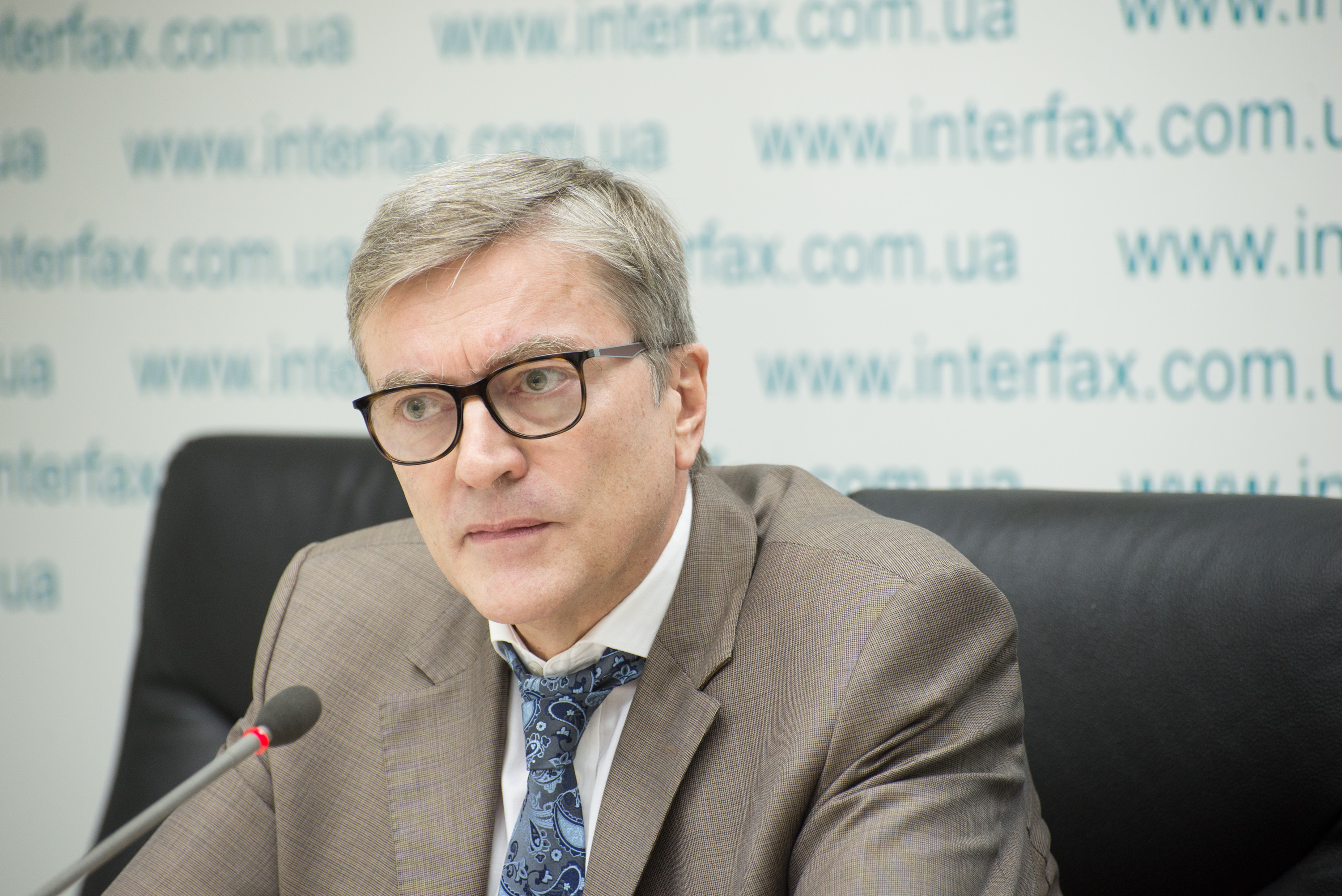
“For the first time, Ukraine ranges among the European countries in terms of the cost of licensing procedures not only geographically. We progressed due to the reduction of share participation in the capital. It is believed that share participation fills local budgets, but, in fact, the proceeds from it is about 1% in the revenues of local budgets. In 2016, revenues from share participation payments totaled 1.35 billion hryvnas at the country level, 42% of which was provided by Kyiv. If we measured the position in the Doing Business rating not only in the
capital, but in other cities as well, Ukraine would ranks 100 in the component “Obtaining construction permits”, because in Odessa, for example, the share contribution is 10%,” the BRDO Construction Sector Head Olena Shulyak said.
Olena Shulyak added that the real estate tax brought more money into the budget than share participation payments. Moreover, to improve Ukraine’s positions in the Doing Business rating in the component “Obtaining construction permits” next year, it is important to support the draft law No.7084 that will protect the rights of investors in housing construction.
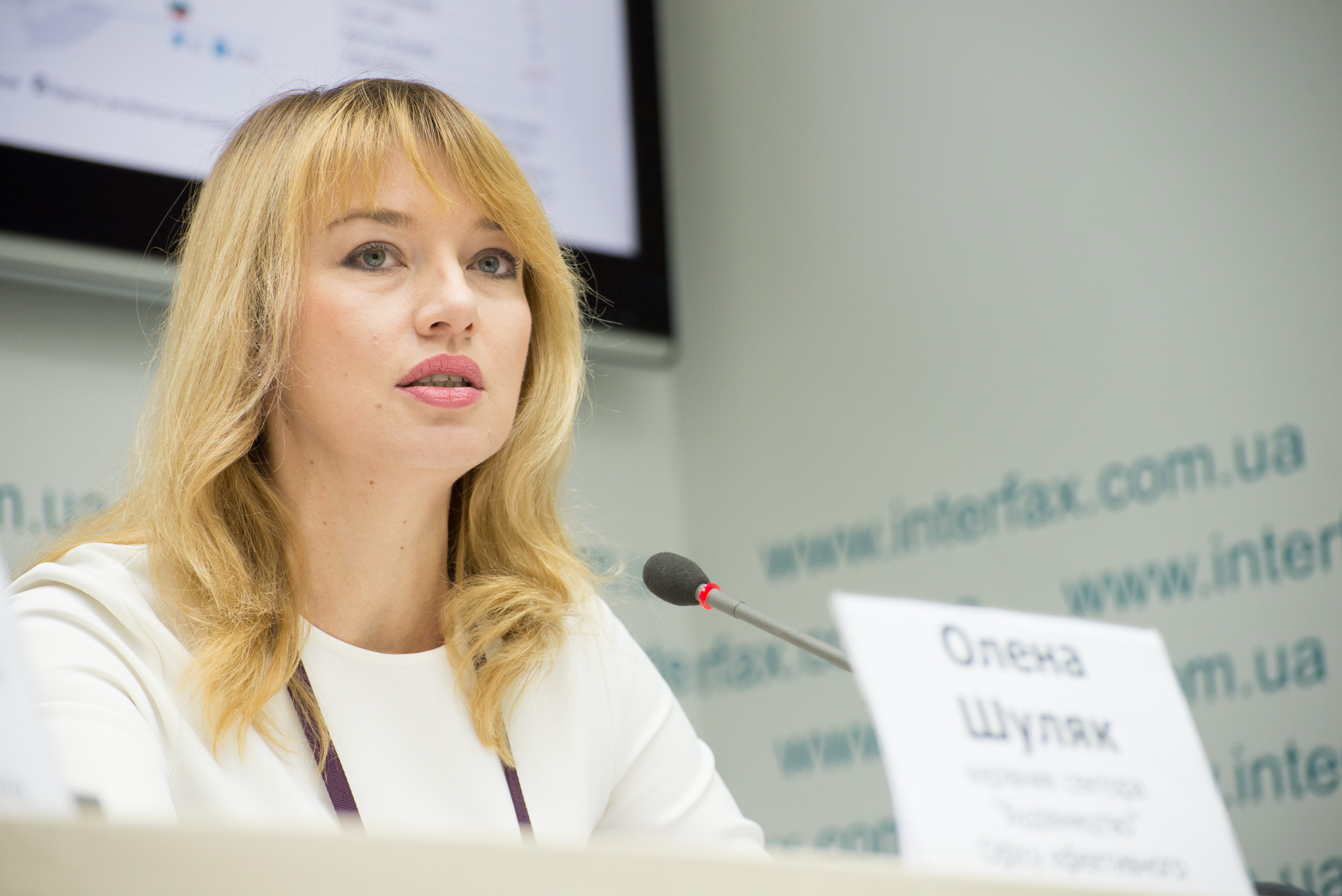
For information: The World Bank’s Doing Business rating is a result of the annual research assessing the ease of doing business based on 10 indicators in 189 countries. Components of the rating assess the legislative acts that regulate activities of small and medium enterprises throughout their life cycle as well as their actual use in practice.
[gview file=”https://brdo.com.ua/wp-content/uploads/2017/11/UKRAYINA-V-REJTYNGU-DOING-BUSINESS_BUDIVNYTSTVO-1.pdf”]
In Ukraine, the domestic consumption of cement is considerably lower than at the European level, and 3/4 enterprises in the market are unprofitable. The share of counterfeit cement in the Ukrainian market is 60%, and with the termination of the system of mandatory product certification on January 1, 2018, concerns about the quality of products will increase. The current legislation does not provide effective mechanisms for market supervision and consumer protection.
What regulatory changes are required for effective control of the cement market? How to ensure the European quality of construction materials and protect consumers from dangerous products? How to reduce the number of unprofitable enterprises in the market and introduce modern technologies in construction?
The government and business will try together to find answers and ways to solving problems during the round table “European quality of Ukrainian cement: risk factors” on November 14, 2017.
The event will be attended by:
BRDO experts conducted a rolling review of the quality of market regulation, the results of which are presented in an analytical study – the Green Paper “Artificial Construction Materials: Cement” that will be discussed during the roundtable. Details – at www.regulation.gov.ua.
Join the dialogue! The results will be used as the basis to develop particular legislative changes in the market.
Venue: Kyiv, Ministry of Regional Development (9, Velyka Zhytomyrska St.)
Time: 10:30 – 12:30, November 14, 2017
The event’s agenda is available here.
You can register here. Additional information is available by phone: 063 440 47 07.
Media accreditation – at [email protected] till 18.00 on November 13.
The press conference “Construction in Doing Business-2018: record-breaking rise, and what should be done to prevent falling” will take place in the press center of the Interfax-Ukraine news agency at 12:30 on November 8.
The event will be attended by:
On October 31, 2017, the World Bank published a new rating of ease of doing business – Doing Business-2018. According to its results, Ukraine has risen by 4 positions to rank the 76th among 190 countries of the world, and in terms of “Obtaining construction permits” – by 105 positions to rank the 35th and be in the TOP-40 for this criterion.
Organizers: Better Regulation Delivery Office (BRDO), Ministry of Regional Development, Construction, Housing and Utilities of Ukraine.
Venue: Kyiv, 8/5a Reitarska Street, press center of the Interfax-Ukraine news agency.
Event starts at 12:30.
You need to have a press card for media accreditation. More information by phone 0506899328
The National Forum on Construction Project Management will take place in Kyiv on November 16-17.
This is not an exhibition of building materials or an award ceremony, it is the first event in Ukraine devoted to people in the construction industry: only real cases, only real experience. During the two-day forum, you will learn how to implement construction projects in proper time and within the budget as there will be 35 speakers – directors and project managers of construction companies, representatives of the government and local authorities.
If you run construction projects, design buildings or your work is related to land and city cadastres – this is your “RED Day”, because for the first time you will have an opportunity to learn about the management of construction projects and cadastre issues firsthand.
The National Forum’s program is divided into two thematic events:
On November 16 – Cadastre Camp – we will discuss issues and prospects of land and city planning cadastres as well as special aspects of registration of urban lands and land plots outside of settlements.
On November 17 – Real Estate Development Project Management Day – a day of exchange of real experiences. There will be personal networking, examples of successful and failed cases. Within the Investments & Innovations section, representatives of cities will compete for the title “Cities with the simplest procedures for obtaining permits”.
Key events of the National Building Management Forum 2017:
On November 16, CADASTRE CAMP. There will be two panel discussions “Urban lands” and “Lands outside of settlements”: issues of city planning and land cadastres will be discussed with participation of representatives of city and regional departments of architecture, land resources management, the State GeoCadastre and experts on extra-territoriality. Valentina Antonenko and Vladyslav Smilka (Department of Urban Development and Architecture of the Kyiv City State Administration), Oleksandr Krasnolutsky (State GeoCadastre) and Oleksandr Yermolayev (Department of Land Resources of the Kyiv City State Administration) will participate in the discussion.
During CADASTRE CAMP, you will also hear interesting reports by Lyudmyla Shemelynets (State GeoCadastre), Ihor Raykov (Urbanland.pm, Inger-Grad), Anatoliy Poltavets (NGO “Land and Architectural Initiatives”) and others.
Lev Partskhaladze (Ministry of Regional Development) will open up the RED PM DAY, Oleksiy Honcharuk (BRDO) will present the Doing Business rating, Dmytro Sennychenko (Ukrposhta) will talk about the possibilities of cooperation with Ukrposhta in 2018, and Volodymyr Mysak (Cushman & Wakefield) will tell you about investment trends in commercial real estate (comparative analysis of the Ukrainian market and the countries of Eastern Europe).
Within the Project Management section, construction project managers will share their real experience: Ivan Puholovkin (Astarta organic business centre), Yuliya Dvorakovska (CBMforum engineering company Ukraine), Andriy Nekrasov (Arricano Real Estate), Andriy Ryshykov (DC Evolution), Yaroslav Rekunyk (Geos Project Development Kit, Hungary), Serhiy Fedoryk (M.V. Cargo).
Within the Investment section, the representatives of city authorities will tell you why you need to invest in construction projects in Kyiv (Oleksdandr Mishenko), Lviv (Vadym Nozdrya), Vinnytsya and other cities. You will also learn more about the future development of such projects as UNIT.City (Maksym Yakover, Bakhmatov) and the Kharkiv School of Architecture (Oleh Drozdov).
The event will end with a panel discussion with the participation of Oleksiy Polishchuk (Department of Land Resources of the Kyiv City State Administration), Oleksandr Svistunov (Department of Architecture of the Kyiv City State Administration), representatives of the State GeoCadastre, State Architectural-Construction Inspection and the Ministry of Culture of Ukraine.
You can find the full program of the Forum at redpmday.urbanland.pm, and get the latest news on Facebook (https://www.facebook.com/events/113639852640769).
We will be glad to see you among the participants of the Forum!
Self-regulation as a form of administration and self-control of business associations in world practice significantly reduces the administrative pressure on business and promotes higher standards of business activities, and hence – better protection of consumers’ interests.
In Ukraine, the legislation allows to create self-regulatory organizations in 15 types of activities. In fact, there are only 20 SROs established in 5 types: appraisal practice, land evaluation, land management, architectural activities and professional activity in the securities market. At the same time, dozens of organizations and associations with self-regulatory characteristics and functions can not obtain an official status as it is not stipulated by law.
The government, business and public representatives as well as experts discussed the issues of the introduction and functioning of self-regulation in Ukraine during the round table “Self-regulation in Ukraine: balance of business, government and consumer interests” as part of the Public Dialogue #PRODialogue on November 3.
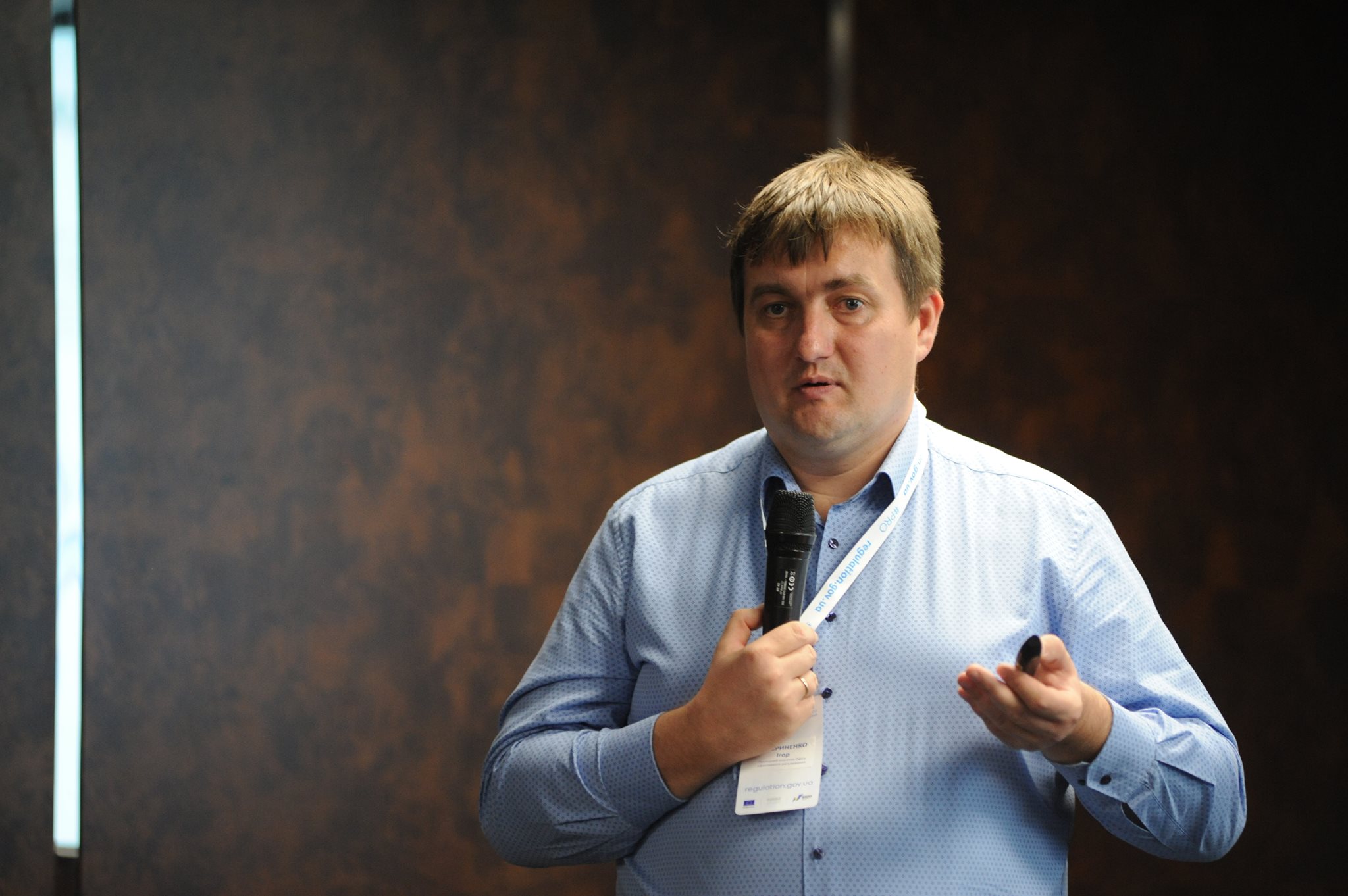
“In Ukraine, there is currently no holistic approach to self-regulation. 39 regulatory acts that form the regulatory framework do not make it possible to determine either the goals of self-regulation or the status of a self-regulatory organization. The self-regulation is formally impossible in most types of activities due to the lack of special laws, while it is allowed to create SROs for some types, but no procedure is foreseen. For example, it is advertising, audit and security guard activities,” the BRDO leading analyst Ihor Lavrynenko said, presenting the results of the review of the regulation quality in this area – the Green Paper “Self-regulation in Ukraine”.
For example, the tourism industry, where powerful organizations and associations have been operating for more than one year, while being capable of implementing the self-regulation and exercising similar SRO functions, but in fact, can not obtain this status.
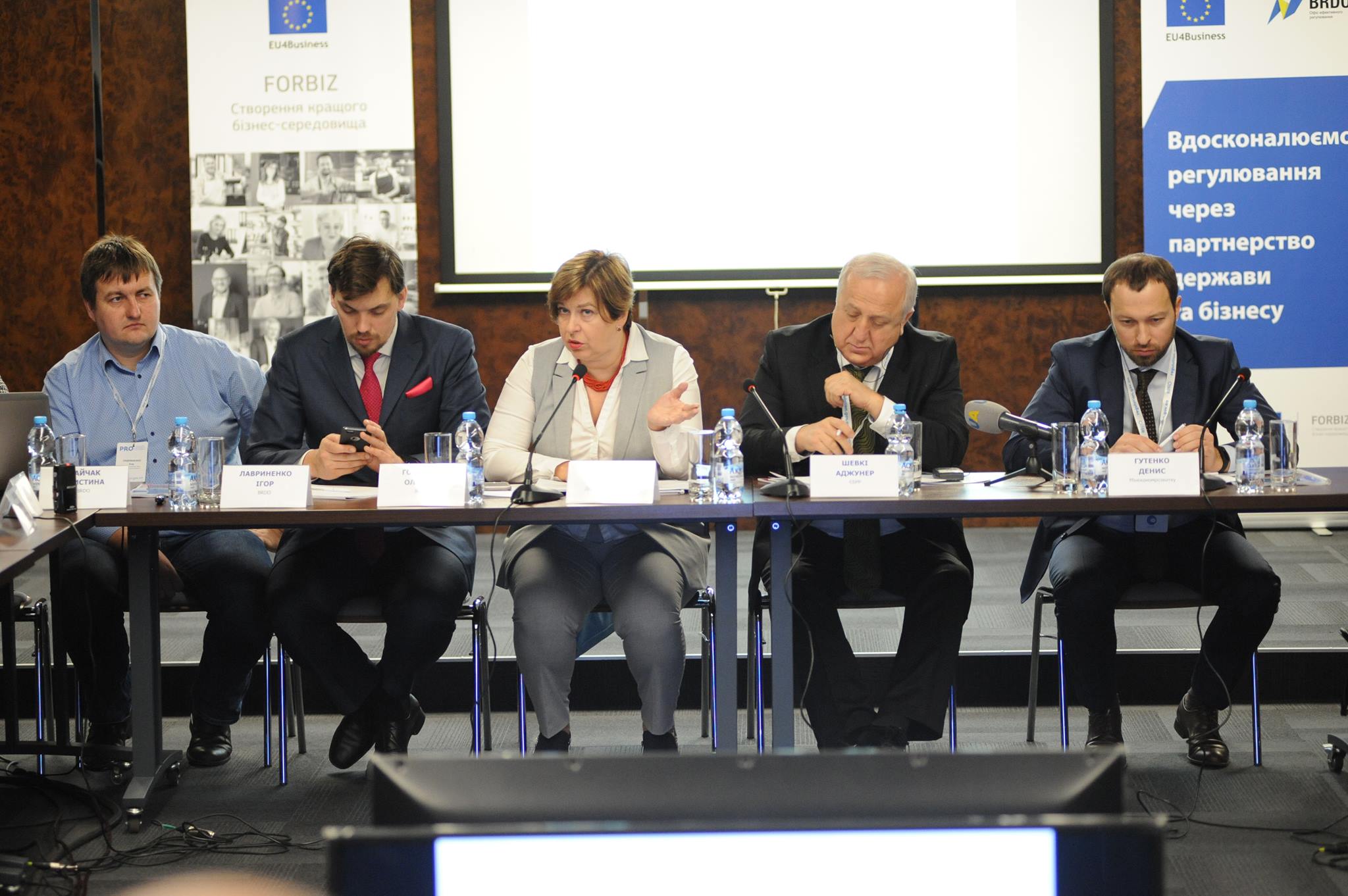
As for the areas, in which SROs have delegated powers, they vary chaotically in each particular activity. This provokes abuses of granted official powers by civil servants/SRO bodies. In particular, the construction industry, where only the SRO is entitled to allow carrying out professional architectural activities, but it often refuses to citizens, who are not members of such an organization, contrary to the law or makes unreasonable demands for professional liability insurance.
“The main problem, which is voiced everywhere and makes us today talking about deregulation and self-regulation, is distrust of business to the state. But do business representatives trust each other, so they could jointly agree on consolidated requirements in addition to the state ones and jointly fund an organization that will monitor their compliance? I have doubts. If they trusted each other, we would already have effective self-regulatory organizations,” the Head of the State Regulatory Service Kseniya Lyapina emphasized.

“The SRO regulation is a very delicate process. It is important to keep the balance and control of the process – on the one hand, preserving the powers of government bodies and, on the other hand, providing self-regulatory organizations with an opportunity to develop, implement their own requirements and rules,” the EBRD Director in Ukraine Shevki Adjuner said.
“We understand that it is necessary to start with developing the policy, but not the laws. As a result, it will become clear whether the law is needed or not and how exactly the state policy in self-regulation should be developed,” the BRDO Head Oleksiy Honcharuk said.
The event was attended by representatives of the Ministry of Economic Development and Trade, the Ukrainian Chamber of Commerce and Industry, the Professional Association of Capital Market Participants and Derivatives, the PU “All-Ukrainian Agrarian Council”, the Phytosanitary Association of Ukraine, business, expert circles and the public.
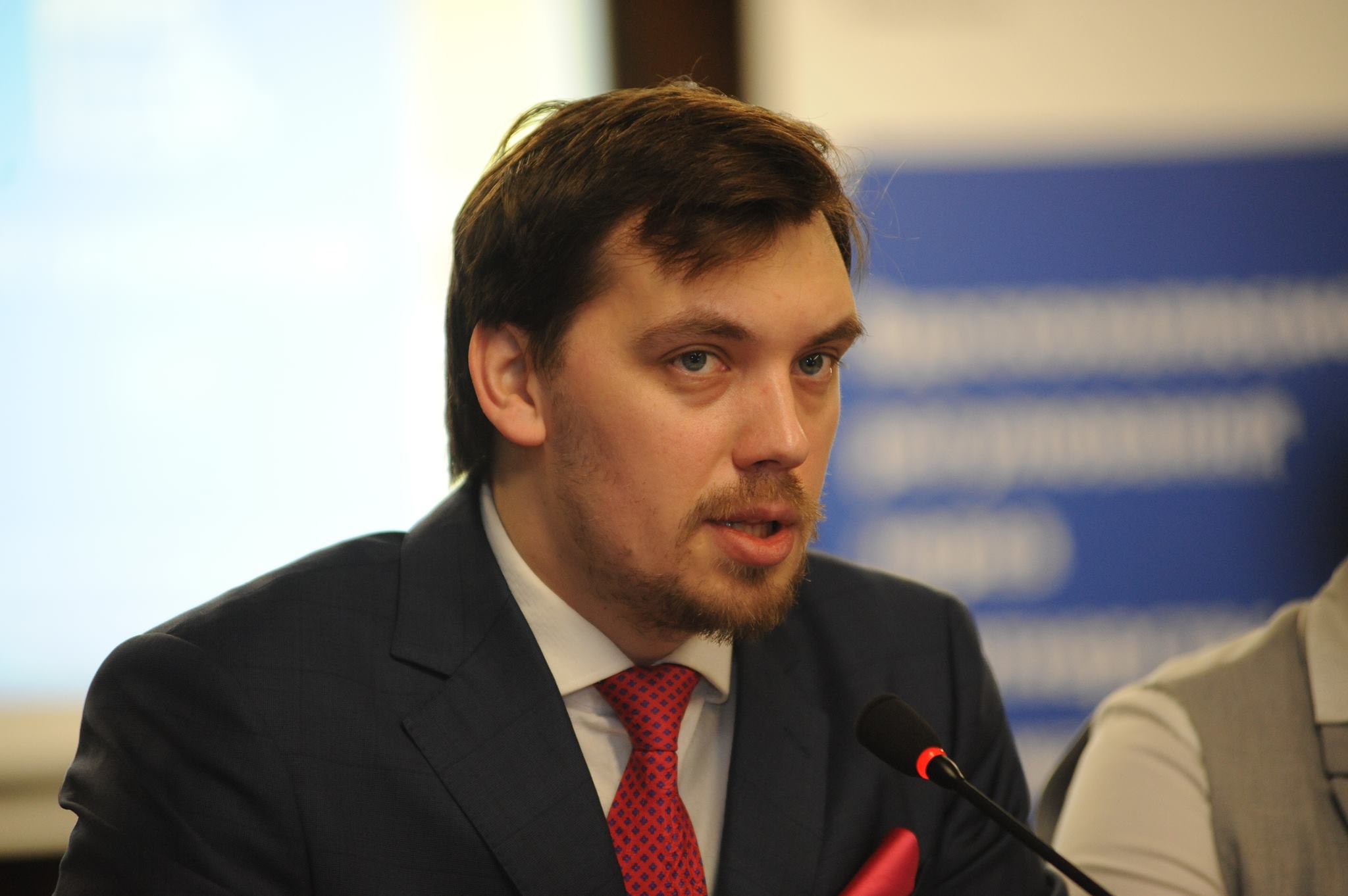
Source: liga.net.
Ukraine demonstrated a breakthrough in the Doing Business ranking as a result of improvements in construction. The Construction Sector Head at BRDO Olena Shulyak explains why this achievement may turn out to be temporary.
The last week of October becomes for me a period of reviewing expert assessments regarding the change of regulatory legislation in the Ukrainian construction industry for four consecutive years. On the last day of October, World Bank Group experts announced the results of the annual Doing Business index. The Group’s analysts complete their work on collecting all data on business regulation in 190 countries on the last day of May and consolidate them during June-October. And traditionally, along with World Bank experts, local analysts provide forecasts on changing the ranking of ease of doing business in their own country.
Ukraine has been constantly trying to improve its positions. We have shown a significant progress having risen from 147 position among 183 countries in 2010 to 76 out of 190 countries in the latest ranking. However, Ukraine has never been able to significantly improve the indicator of “obtaining construction permits” until this year.
The Doing Business methodology implies assessing the quality and effectiveness of regulation in a particular city of the country (sometimes in a few of them). As a rule, in the capital. The main indicator that kept Ukraine within 140 position is the cost of licensing procedures, which according to estimates of World Bank experts, totaled 15.2% of the estimated construction cost.
Overregulated construction procedures and their high cost have been keeping Ukraine within 130-140 positions in terms of this indicator for almost ten years. This, of course, also affected the overall rating. But a miracle had happened! In 2017, Ukraine made a breakthrough in the category of “obtaining construction permits”, and we moved from position 140 to 35.
I predict a huge number of news and press releases about a new triumph, a significant advancement of reforms and the ease of doing business in the coming months. And all this will be true. But, unfortunately, it will be partially true…
What helped us make a significant progress in terms of the indicator of Dealing with construction permits?
First of all, reducing the cost of procedures from 15.1% to 3.1% (documents registration costs and share participation – LIGA.net) had a positive impact on increasing Ukraine’s positions in the rating. This indicator was partly influenced by the clarification of the technical inspection cost (from 5% to about 1%) in the total construction costs. As a result, the cost of licensing procedures decreased by almost 4%. We finally left Togo, Sudan and even Senegal behind in terms of construction costs.
But we got the main progress due to a temporary decision of the Kyiv city council. The fact that the Doing Business methodology implies assessing the quality and effectiveness of regulation in a particular city of the country (sometimes in a few of them). As a rule, in the capital. The main indicator that kept Ukraine within 140 position is the cost of licensing procedures. According to estimates of World Bank experts, it totaled 15.2% of the estimated construction cost. Additionally, experts use standard technical requirements – obtaining a permit and construction of a 14,000 sq ft warehouse (1 foot = 0.09 sq km) – to prepare the rating for each country.
A decreasing coefficient for paying share participation in Kyiv will no longer be used from the beginning of 2018. And of course, this will negatively affect not only the indicator of obtaining construction permits, but also the overall rating of the country.
Some experts found out that at one time, Macedonia slightly “cheated” to conduct an assessment under the Doing Business rating. The country’s government maximally simplified construction conditions just for warehouses, which exactly corresponded to the technical requirements of the methodology. As a result, the Balkan country has significantly improved its position in the rating without significant improvements for business.
We saw a similar situation in Ukraine. In the end of 2016, the Kyiv authorities reduced the share contribution to infrastructure development from 10% to 4% and set a decreasing coefficient of 50% for 2017. In such a way, 2% instead of 10% as before was taken into account in the calculation of the cost of licensing procedures under World Bank methodology.
In the new rating, we demonstrated a lower index of the cost of construction procedures than on average in the region, and it is only 10 times higher than the cost in Poland (0.3%) and 32 times more than in Slovakia (0.1%).
In this context, we should note that a decrease in the share contribution size in Kyiv does not reflect the situation in Ukraine as a whole. There are still 10% in Odessa, Lviv, Vinnytsya as well as in most other cities…
Thus, the 35th position in terms of this indicator is our achievement. But the decreasing coefficient for paying a share contribution will no longer be used in 2018. Ukraine will again move from the average index of the cost of obtaining permits to high costs in the region. And in the next rating, we have all the chances to “get back” our position of outsiders. This is the price of situational non-systemic regulatory decisions.
The decreasing coefficient for paying share participation in Kyiv will no longer be used from the beginning of 2018. It will be 4%. And of course, this will negatively affect not only the indicator of obtaining construction permits, but also the overall rating of the country. The cost of licensing procedures, which is higher than all our neighbors have even under the present conditions, will again become higher than on average in the region at best.
Currently, we are starting the countdown from preparations to the implementation of reforms that will be taken into account in the rating already in 2019. And we – experts, business, the public, legislators, civil servants and local authorities – have all the chances to keep and improve the investment image and the business environment of Ukraine while implementing reforms and eliminating excessive financial burdens, in particular, through the cancellation of share participation as a hidden tax on investments, in our hands.